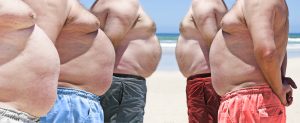Stress as Cause of Weight Gain
This a continuation of part 1. Cortisol, as indicated in part one, is a stress steroid hormone. Many health experts say cortisol is public enemy number one. Researchers and doctors alike have indicated that it is a major cause of poor health in patients with chronic elevated stress and cortisol. How does it do this? Is there any research behind it?
Stress is a huge problem affecting the health of Americans. It is not only impacting our health, but it is also adding to our waistlines. We work too much and too hard. We do not take as much time off as the rest of the world so we have repetitive stressors that are single assaults to the body and are additive. Over time, if you do not have downtime to recover, you will have repeat degradation of the body’s ability to perform at a high level.
I have plenty of knowledge on this topic. I can remember my first year of medical school and classes on biochemistry and physiology. The key to understanding weight gain with stress is to understand a single hormone and that is Cortisol. My instructors in medical school taught me a lot about cortisol and its effects on the human body. It was clear that cortisol has many negative effects on healthy body weight and inflammation if exposure is chronic (long-term and repetitive). Is there any research to back this up or is this just a concept based on models taught in biology and medical school?
Today has been a bad day for me. It has been very stressful and it is not due to the election results. That being said, I only got 3 hours of sleep because of the election results. I could not go to sleep until after the outcome had been determined. A lack of sleep not only increases our stress levels, but it also decreases our ability to adapt to the stress of normal life. I have eaten about 500 calories more than I should have today. Those Reese’s Pieces and Kit Kats are not going to help my stress. To be blunt, comfort foods like Twinkies and doughnuts are only going to expand my waistline and will do nothing to reduce my stress.
Cortisol is one of the stress hormones that is released at night from your adrenal glands (a gland above each kidney) while you sleep and it encourages the storage of energy and repair of the human body. The negative effects of cortisol are very clear and are illustrated thoroughly in medical textbooks and journals. It makes you sleepy and results in the storage of energy as fat. Both are likely not what you want if you are dieting or trying to maintain your weight.
Research:
- Gluck et al performed a study of cortisol and stress levels on women with binge eating disorders. Gluck has done several studies looking at stress and eating disorders, but in this study, the researchers looked at stress, depression, cortisol and hunger, and binge eating. The study showed that the stress and cortisol levels are directly proportional to both weight gain and hunger[1]. It is not the best study but it does show a correlation between eating habits and cortisol levels. I do not need a supportive study, because if you binge eat, you will gain weight.
- Another researcher, Epel, has done several studies on this topic also. Epel looked at both stress-induced eating and central obesity in two separate studies. The first study looked at groups that were high-stress reactors and those who were not. The study revealed: high cortisol reactors consumed more calories on the stress day compared to low reactors, but ate similar amounts on the control day. In particular, high reactors ate significantly more sweet food. Increases in negative mood responses, when exposed to the stressors, resulted in significantly greater food consumption[2]. The second study by Epel, looked at the correlation of stress, cortisol, and central obesity. If you understand cortisol, you will understand why this is important. Cortisol is a signal to store fat on your waistline. This study showed: Central fat distribution is related to greater psychological vulnerability to stress and cortisol reactivity. This may be especially true among lean women. It shows stress-induced cortisol secretion may contribute to central fat and demonstrates a link between psychological stress and risk for disease such as diabetes and heart disease[3].
- Likely my favorite support study was done at Ohio State University. This study looked at depression, stress, cortisol, and weight gain. The study showed a significant impact between these conditions and hormones. In particular, groups exposed to stressors and no stressors resulted in the stress group having an increase of 104 calories per day which is a difference that could add almost 11 pounds per year. This finding illustrates how stress and depression alter metabolic responses to high-fat meals in ways that promote obesity[4].
- In another study, Dallman looked at chronic obesity and stress in a pair of studies in 2003 and 2006. The studies looked at the effects of chronic stress on cortisol levels and obesity. The researchers found that eating comfort foods resulted in both elevated cortisol levels and central obesity[5],[6]. It is also interesting that central obesity results in a higher risk of diabetes and hypertension so the long-term health risks are significant.
- Adam and Epel looked at stress, eating, and reward systems and found that it appears the obesity epidemic may be exacerbated by the preponderance of chronic stress, unsuccessful attempts at food restriction, and their independent and possibly synergistic effects on increasing the reward value of highly palatable food[7].
- Pecoraro looked at chronic stress and palatable feedings. The results of this experiment support the model of chronic effects of stress and cortisol, showing a stressor-induced preference for comfort food[8]. Clearly, we crave low-value sugary and starchy foods when we are stressed.
- One last study by Tomiyama found that subject that was chronically stressed ate calorie-dense foods and developed greater mesenteric (belly) fat than those who were not stressed. The study also revealed that those that had higher stress tended to comfort themselves with higher levels of food[9].
The key concept is that stress does contribute to weight gain and less success when you are trying to maintain or lose weight. When we are stressed, we crave low quality foods that comfort our feeling of stress. I would recommend that if this is a problem for you that you consider stress management to help you find another means to reduce your stress outside of comfort foods and eating. There is no magic bullet, but if you can reduce comfort foods, it might be as close as one solution comes. If you find stress-eating comfort foods to be a problem, find a means to lower your stress.
References:
-
Adam, TC, and ES Epel. “Stress, Eating and the Reward System.” Physiology & Behavior 91, no. 4 (July 24, 2007): 449–58 [PubMed]
-
Dallman, MF, N Pecoraro, SF Akana, Fleur La, F Gomez, H Houshyar, ME Bell, S Bhatnagar, KD Laugero, and S Manalo. “Chronic Stress and Obesity: A New View Of ‘comfort Food’.” Proceedings of the National Academy of Sciences of the United States of America 100, no. 20 (September 30, 2003): 11696–701 [PubMed]
-
Dallman, MF, NC Pecoraro, Fleur La, JP Warne, AB Ginsberg, SF Akana, KC Laugero, et al. “Glucocorticoids, Chronic Stress, and Obesity.” Progress in Brain Research 153 (January 1, 2006): 75–105 [PubMed]
-
Epel, E, R Lapidus, B McEwen, and K Brownell. “Stress May Add Bite to Appetite in Women: A Laboratory Study of Stress-Induced Cortisol and Eating Behavior.” Psychoneuroendocrinology 26, no. 1 (January 1, 2001): 37–49 [PubMed]
-
Epel, ES, B McEwen, T Seeman, K Matthews, G Castellazzo, KD Brownell, J Bell, and JR Ickovics. “Stress and Body Shape: Stress-Induced Cortisol Secretion Is Consistently Greater among Women with Central Fat.” Psychosomatic Medicine 62, no. 5 (January 1, 2000): 623–32 [PubMed]
-
Gluck, ME, A Geliebter, and M Lorence. “Cortisol Stress Response Is Positively Correlated with Central Obesity in Obese Women with Binge Eating Disorder (BED) before and after Cognitive-Behavioral Treatment.” Annals of the New York Academy of Sciences 1032 (December 1, 2004): 202–7 [PubMed]
-
Kiecolt-Glaser, JK, DL Habash, CP Fagundes, R Andridge, J Peng, WB Malarkey, and MA Belury. “Daily Stressors, Past Depression, and Metabolic Responses to High-Fat Meals: A Novel Path to Obesity.” Biological Psychiatry 77, no. 7 (April 1, 2015): 653–60 [PubMed]
-
Pecoraro, N, F Reyes, F Gomez, A Bhargava, and MF Dallman. “Chronic Stress Promotes Palatable Feeding, Which Reduces Signs of Stress: Feedforward and Feedback Effects of Chronic Stress.” Endocrinology 145, no. 8 (August 1, 2004): 3754–62 [PubMed]
-
Tomiyama, AJ, MF Dallman, and ES Epel. “Comfort Food Is Comforting to Those Most Stressed: Evidence of the Chronic Stress Response Network in High Stress Women.” Psychoneuroendocrinology 36, no. 10 (November 1, 2011): 1513–19 [PubMed]










Be the first to comment on "The Battlefield: How Cortisol Makes You Fat and Unhealthy"